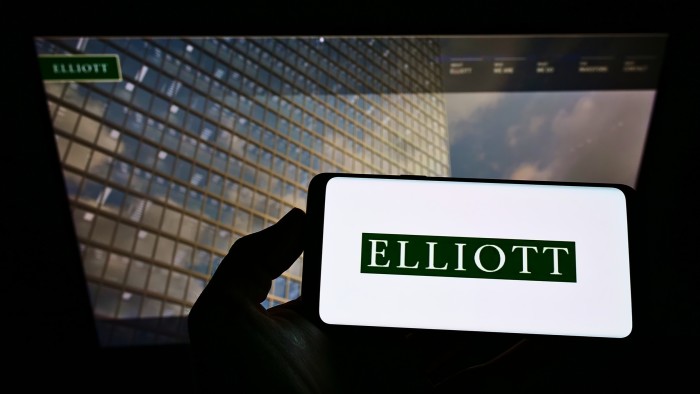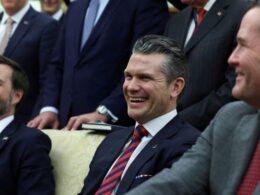One scoop to start: US President Donald Trump’s media regulator was in talks with Paramount about concessions the studio must make to win approval for its $8bn merger with Skydance, according to people familiar with the matter.
And another thing: Democratic legislators have warned top law firms that the deals they have struck with Trump to avoid being targeted by punitive executive orders may violate federal and state laws.
Welcome to Due Diligence, your briefing on dealmaking, private equity and corporate finance. This article is an on-site version of the newsletter. Premium subscribers can sign up here to get the newsletter delivered every Tuesday to Friday. Standard subscribers can upgrade to Premium here, or explore all FT newsletters. Get in touch with us anytime: Due.Diligence@ft.com
In today’s newsletter:
-
Elliott’s Big Oil operator
-
Big Four partners go it alone
-
Nomura’s path back from Archegos
The fearsome activist taking on Big Oil
Elliott Management is unquestionably the world’s most forceful activist investor.
Over the past decade, the hedge fund has run a series of high-profile campaigns against energy majors.
Since its first brawl with oil and gas group Hess in 2013, Elliott has invested at least $21.6bn in listed energy companies, muscling its way into businesses from BP to Phillips 66.
But little is known about the mastermind behind many of Elliott’s gambits. Even as the world of activist investing has tamed and Elliott itself has softened, its man in the energy sector has maintained the firm’s old chutzpah.
Since his battle with Hess, he has won 13 board seats across five energy companies, and has even gone so far as to mail proxy materials to shareholders in his attempts to bring them on board.
A tall southern Californian, John Pike graduated from Yale Law School and exudes a calm and deliberate manner. Last year, he ascended to Elliott’s powerful 12-person management committee.
Those who have worked with him say Pike is one of Elliott’s shrewdest investors, and former colleagues say he embodies the hedge fund’s “old aggressive style”.
One person who came up against Elliott several times described Pike as “a lone wolf inside of Elliott who wants to do things a different way”.
The campaigns Pike has worked on are linked by a set of common themes.
Elliott has called for large energy conglomerates to be broken up to focus on core competencies.
It regularly asks for asset divestments and (aside from one campaign, not led by Pike) has opposed ownership of renewable energy businesses.
After Elliott’s stake in BP was made public in February, the oil major promised to slash spending on green energy and sell off $20bn of assets.
The Pike-led fight for Phillips 66 has incorporated an eclectic mix of media to woo shareholders.
There’s a podcast series (featuring a rare interview in which Pike strikes down the board’s objections to his proposals), the usual barrage of press releases and an Instagram account replete with charts berating the company’s performance.
The days of Elliott seizing warships might be over, but board members at the receiving end of Pike and his team’s letters still tremble all the same.
The Warburg-backed Big Four breakaway
Many UK partners at PwC were surprised when Marissa Thomas, the firm’s chief operating officer, was kept off the ballot for senior partner last year.
Thomas had run the deals business and the tax division before becoming the effective number-two executive, and had deep ties to PwC’s lucrative private equity clients.
She had long been tipped as a favourite to run the whole firm.
But in the end, it wasn’t to be, and Thomas quit PwC in February, leaving everyone guessing what she would do next.
Thanks to the FT’s Stephen Foley and Ellesheva Kissin, we now know the answer.
They scooped the launch of Unity Advisory, a Warburg Pincus-backed professional services firm that aims to peel off clients from Thomas’s old firm and the rest of the Big Four.
Thomas told the FT that Unity would be hiring staff with Big Four experience, including those who have left those firms for jobs in industry. They’ll also target mid-size corporate clients with revenues in the £500mn- £1.5bn range, particularly those backed by private equity.
Unity offers tax, accounting, deals and technology help to chief financial officers with none of the conflict of interest worries that plague the Big Four, whose audit businesses trigger heavy regulation.
When the FT asked if Unity had thought about going into audit, she responded with one word: “no”.
There were also a couple of pointed remarks about the Big Four model from Steve Varley, who will be Unity’s chair. Varley ran EY UK for nine years, so he knows the drill.
“The Big Four are a classy bunch of service providers,” he said, “but people are looking for a proposition that is super client-centric, has really low administrative cost, is AI-led rather than based on legacy infrastructure and, crucially, has no conflicts”.
Nomura goes ‘max risk’
Japan’s biggest brokerage and investment bank, Nomura, was one of the banks hit hardest by the meltdown of Bill Hwang’s family office Archegos, taking a $2.9bn hit in the 2021 episode.
In the following years, Nomura underwent a series of changes led by British banker Christopher Willcox, who was brought in to overhaul the bank’s global investment operations.
Now, Nomura’s traders are finally closer to being able to go “max risk”, Willcox told the FT’s David Keohane and Leo Lewis.
In an interview, he said he was increasingly confident of taking bold, high-stakes bets — having done the “boring, foundational, basic stuff” since he took over as head of Nomura’s trading, investment banking and international wealth management businesses.
The change comes as Nomura tries to shift towards stickier sources of revenue, particularly from wealth and asset management.
Under CEO Kentaro Okuda, the bank is trying to take advantage of Japanese savers reaching for yield as inflation returns to the country.
As part of that strategy, Nomura this week agreed to buy Macquarie’s US and European public asset management business for $1.8bn.
The deal is its biggest since the 2008 purchase of Lehman Brothers’ Asian and European assets — something that put the bank on the global stage but mired management in years of troubled integration.
Willcox, whose $12mn pay cheque last year was three times more than Okuda’s, was parachuted into the bank four years ago from JPMorgan Chase and promoted a year later to lead and reform the wholesale business.
Results have so far been encouraging as its risk appetite reaches a new dimension.
Job moves
-
Evercore has hired former CIA director William Burns as a senior adviser. He served for three and a half decades as a US diplomat, in roles including deputy director of state, and ambassador to Russia.
-
US Investment Accelerator, the Trump administration’s vehicle for attracting investment to the US, will be headed by Morgan Stanley’s former top Silicon Valley dealmaker Michael Grimes, reports The Wall Street Journal.
-
Hg has appointed Brian Mason as chief information officer. He was previously group chief technology officer at BC Partners.
Smart reads
Trump bump Washington lobby group Ballard Partners is raking in money as businesses rush to gain favour with the White House, the FT reports. The group counts major banks, healthcare groups and Hollywood studios among its clients.
Dead weight Expensive investment bankers are sitting idle and weighing on the finances of boutique outfits, Lex writes. Unless the dealmaking slump abates, profit margins will not be pretty.
A smart listen DD’s James Fontanella-Khan joined the FT’s Unhedged podcast on Thursday to discuss what Wall Street titans really think about Donald Trump.
Due Diligence is written by Arash Massoudi, Ivan Levingston, Ortenca Aliaj, Alexandra Heal and Robert Smith in London, James Fontanella-Khan, Sujeet Indap, Eric Platt, Antoine Gara, Amelia Pollard, Maria Heeter, Kaye Wiggins, Oliver Barnes and Jamie John in New York, George Hammond and Tabby Kinder in San Francisco. Please send feedback to due.diligence@ft.com
Recommended newsletters for you
Source link









